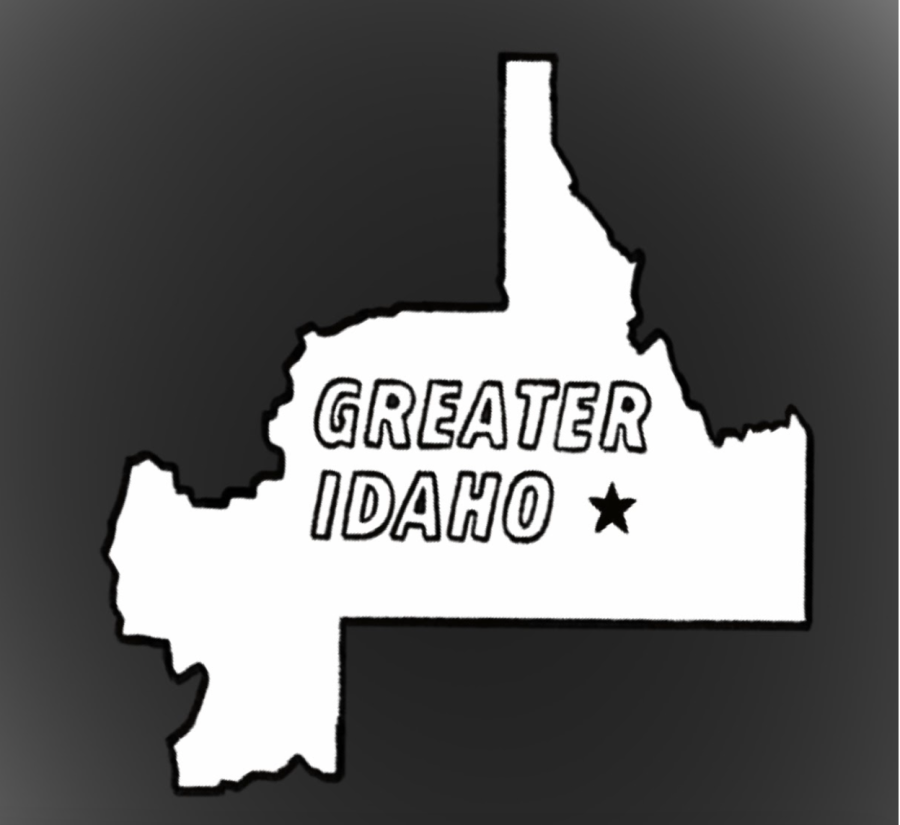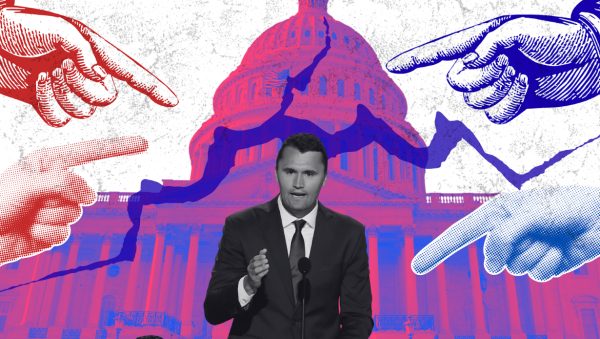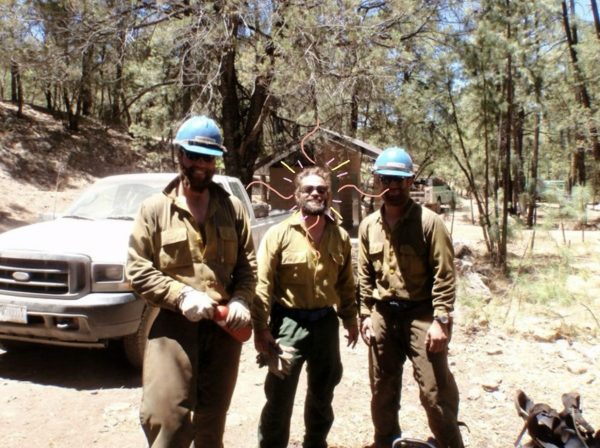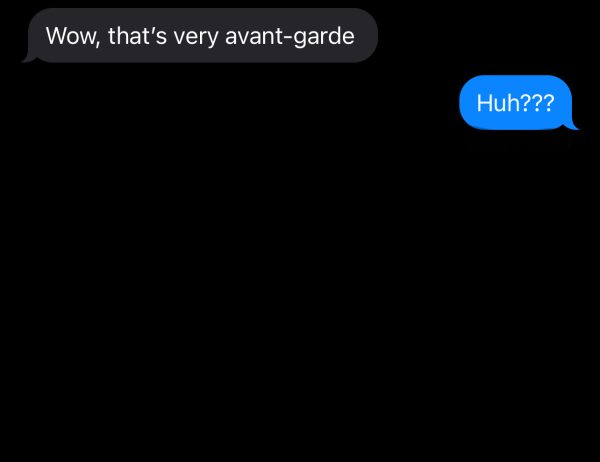Greater Idaho: A Deeply Misguided Endeavor
A better Oregon and a worse Idaho; knowingly or not, that’s what Citizens For A Greater Idaho is fighting for.
Northwest Oregon can feel like a haven of progress and prosperity, but this perception is not ubiquitous across the state. Throughout the northwest, secession movements in rural areas have gathered mass support. The most influential of the bunch is the Greater Idaho movement. The movement has been described by The Atlantic as “Modern America’s Most Successful Secession Movement.” Last November, Harney County joined seven other Oregon counties in voting to join Greater Idaho. Greater Idaho proposes a move of the state border to make rural Oregon and Northern California a part of Idaho. It would leave Bend as the furthest West city in Oregon, and in doing so, double Idaho’s landmass and shrink Oregon’s by over three-quarters.
Citizens For A Greater Idaho, an Organization led by Mike McCarter, is open about their motivation; the movement is about moving conservative counties out of a liberal state.
“Idaho would have the satisfaction of freeing 1.2 million people from blue state law,” said Greater Idaho’s website. Messaging like this reveals a deep alienation from Oregon’s political process, so it’s unsurprising how little it took for Greater Idaho to get off the ground. It began with a letter to the editor published in some rural Oregon newspapers.
Grant Darrow, a former chimney sweep from Elgin, Oregon, wrote this influential letter. When McCarter got involved in 2019, a movement began, picking up supporters from across Oregon, California, and even parts of Washington. Darrow described via email how the movement started.
“People are angry and fighting mad… this will end in one of two ways, violently or peacefully. I put words to this anger in 2015 in a letter picked up by over forty rural newspapers,” said Darrow.
The movement picked up steam from there.
“Mike McCarter of La Pine put legs under it. This movement created a pressure relief valve for the disenfranchised,” Darrow said. Darrow’s account is quite compelling, and though his movement is centered around rural Oregon, he touches on the benefits it will bring to Oregon cities like Bend. “Bend and the Willamette Valley would benefit economically by getting rid of rural eastern and southern Oregon conservative peoples…. We are an economic drain on state coffers [funds] to the tune of $562 per wage earner,” he said.
Darrow, however, didn’t answer all of the questions he was asked, and failed to give specifics about which laws his movement takes issue with.
“Every single law coming out of our legislature is negatively impacting rural Oregonians because we have been disenfranchised,” he said. This statement shows a fundamental misunderstanding of “disenfranchisement,” which Darrow seems to think is simply the process of being outvoted in a democracy, not being denied the right to vote as it is properly defined.
Darrow’s interview is representative of a larger pattern within Citizens for a Greater Idaho, acknowledgment of a few specific ideas or policies with halfhearted ambivalence, followed by a passionate explanation of a deeper, ideological opposition to progressivism and liberal values. Darrow’s statements on democracy exemplify this well.
“When was the last time you heard a politician refer to our form of government as a democracy?… It is not…History repeats itself, and true democracies fail every time,” Darrow said. Darrow does not believe in democracy prescriptively or descriptively; he doesn’t think we have one, and he doesn’t want one. As an alternative, he seeks to bring representation to the least educated and most reactionary parts of the state.
As problematic as it was, Darrow’s interview showed a sincere ideological commitment to conservative philosophy, which was markedly better than the thinly veiled bigotry on Citizens for a Greater Idaho’s website. The movement’s reactionary values were on full display in their pamphlet for rural Oregonians. It makes promises like “No arsonists or rioters let free,” something added in after the Black Lives Matter protests in the summer of 2020. It goes on to criticize Oregon for “Men in girl’s sports leagues,” “Driver’s licenses for illegals” and “Taxpayer funded abortion,” as well as praising Idaho for banning so-called “critical race theory.”
These statements are riddled with disdain for trans people, undocumented immigrants, anti-racism and women who exercise their reproductive rights. In addition, they take issue with even the most benign of government regulations, like helmet laws. Their pamphlet is also full of ridiculous far-right talking points like “The public school curriculum teaches the next generation to hate Americans.”
No community is immune to these dangerous sentiments, and Bend is no exception. However, our communities’ bigotries are less prominent and are not a driving force of our politics to nearly the same extent as the Greater Idaho movement. The open bigotry baked into the movement is why letting rural Oregon secede is so dangerous; they would be separating themselves from more egalitarian political influences in cities, leaving Greater Idaho’s bigotry to express itself without opposition.
Greater Idaho is, at its core, a desperate power grab from reactionaries who feel alienated from the democratic process and threatened by cultural progress. Summit students, current and former, expressed either disdain or ambivalence to the prospect of moving Oregon’s border.
Sara Foran, a junior at Summit, is one such person.
“I think it’s kind of silly and unnecessary. There’s no reason to do it.” As for the motivations behind the movement, she blames the divisive political climate following the last two elections, “everybody wants to blame somebody for whatever situation they’re in.” Foran said.
Dieryel Wade has similar criticisms of Greater Idaho. Wade was a Summit Student up until the start of this year when he moved to Redmond. He now lives on the other side of the proposed border.
“People refuse to get along and live alongside each other, and it leads to ridiculous situations like this.” Wade said.
Despite its plethora of ideological failures, citizens for a greater Idaho managed to be correct about one thing: their proposal would benefit what’s left of Oregon. Northwest Orgon would save a lot of money, there would be less gridlock at the state level without conservative resistance and we would lose very little in terms of federal representation. Urban Oregon wouldn’t be hurt by Greater Idaho; it’s real victim is rural Oregians.
Rural Oregon would lose the funding they get from urban areas and wouldn’t have similar areas in Idaho to offer financial support. The rural counties in Oregon have a similar average income to the ones in Idaho, while Oregon as a whole has a higher average income. Essentially, Citizens for a Greater Idaho is trying to alleviate the economic problems in rural Oregon by moving them to a poorer state with less money to invest in the counties that need it.
Economics, however, would be the least of their worries. In the unlikely event the proposal goes through, the new biggest political influence in Idaho would be a movement that defines its political advocacy around a disdain for the acceptance of minorities and hostility towards those who seek to exercise or expand their rights. Greater Idaho isn’t about helping rural counties; it’s about advancing a conservative agenda that is built on fear and is disconnected from the real problems in rural Oregon.

When AJ isn’t writing for The Pinnacle alongside it’s hard working staff, he might be found working, cooking, or scrolling through TikTok. He loves his dogs, writing for The Pinnacle, and spending...









































Felicity • Mar 15, 2023 at 11:31 am
I wonder how many aged and disabled would be impacted? I also wonder how they will like paying sales tax?
With higher foodstamps (SNAP) & Medicaid rates in Oregon’s rural counties, where high unemployment and poverty are a huge problem, I wish, pray, hope like hell those Greater Idaho peeps have taken those members of their communities into account. Probably not. 400,000 Oregonians recieved SNAP benefits last year with over 70% residing in rural Oregon. Do Idahoans who welcome the Greater Idaho movement understand what that means? As a physically disabled widow I can attest that Idaho gives no Fs for their vunerable citizens.
Solara • Mar 10, 2023 at 9:42 am
Idaho cannot afford its own infrastructure let alone the added area. A move like this will cause more problems than it will solve. The support those western oregon counties get from their state will be gone. Idaho doesn’t do anything for its rural communities. Idaho legislators are the best at blowing hot air.
SueAnn Elliott • May 19, 2022 at 9:10 pm
Great article! I believe the political and “values” to be a way to get people on board. I believe it is a land grab for Lithium and a deep sea port as well as water rights in the Deschutes River areas. Keep up the good reporting!